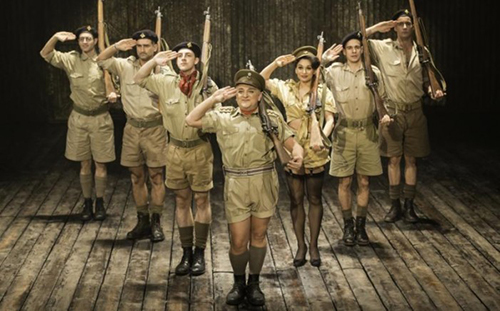
Years ago during a BBC Question Time when the “Don’t Ask, Don’t Tell” debate was raging, a blazered old World War II veteran in the audience was given the floor. He’d served the entire war on board HMS something or other with, “half a ship’s company of queers…” Dimbleby winced, the audience braced itself, “…and a braver bunch of boys it would be impossible to find.” End of debate.
Decades earlier Peter Nichols, who served in the Combined Services Entertainments Unit in Singapore entertaining the troops alongside John Schlesinger, Stanley Baxter and Kenneth Williams, (can you imagine?) wrote Privates on Parade and exposed the British Army’s tacit tolerance, understanding even, of military gays when it suited its wartime purposes. Twenty years after the war in 1967 the Sexual Offences Act decriminalised homosexuality in England and Wales but still excluded the armed forces and Scottish people.
The sexual offences here are heterosexual, the only female member of the troop, an enchanting Sophia Haque, is abused physically by a bent (corrupt) Sergent Major (a commanding Mark Lewis Jones) and emotionally by our precocious protagonist Private Flowers who, in a delicious sideswipe at religion, loses his morals and humanity the more he finds God. Joseph Timms as Flowers pitches his journey perfectly from the arms of Sylvia to the dogma of Major Flack.
So to the star turn and it’s magnificently statuesque and evocative, beautiful but damaged and world-weary but with an exotic twinkle in the eye, yes the set design by Christopher Oram is a shining presence and perfect conduit.
So to the other star turn and it’s magnificently statuesque and evocative, beautiful but damaged and world-weary but with an exotic twinkle in the eye, yes the Honorary Captain Terri Dennis of Simon Russell Beale is a shining presence and perfect conduit.
This is a master class in authenticity, structure and characterisation
Where Nichols’ A Day in the Death of Joe Egg is music hall, and his Poppy is pantomime, Privates on Parade is all ging gang goolie gang show at intervals leading to tricky transitions, exactly where most productions fall down. Michael Grandage and his entire company master these with aplomb. The numbers are wittily staged and where there’s scope – and traps – for cloying campery and amateur theatrics; choreographer Ben Wright and cast understate to greater poignancy. The musical hall act of Flanagan and Allen always sailed close to the shores of bromance and here is used with simplicity to the story’s advantage, sweetly sung and done by Harry Hepple and John Marquez. The final stand and sing, sotto voce, is incendiary in its emotional impact.
Peter Nichols studied acting at the Bristol Old Vic because there were no dedicated courses for playwrights. It’s hard to see how he could have been taught anything; this is a master class in authenticity, structure and characterisation let alone comedy (it’s hilarious) and some of our young playwrights could do worse than buy a ticket and take a lesson. At 85 years old he must have been pleased as punch to see his work in such fine fettle, so to composer Dennis King.
Danny La Rue played Terri Dennis in the late 80’s and well after the vivacity that had made him a sensation had waned. He had authenticity too, having served in Singapore where first he donned a dress of parachute silk but (SPOILER ALERT) when shot at the end he took a full 45 seconds to go down.
The Michael Grandage Company go down a storm, dear.
***** (5 stars)
Runs until 2nd March 2013.
More info
Be the first to comment